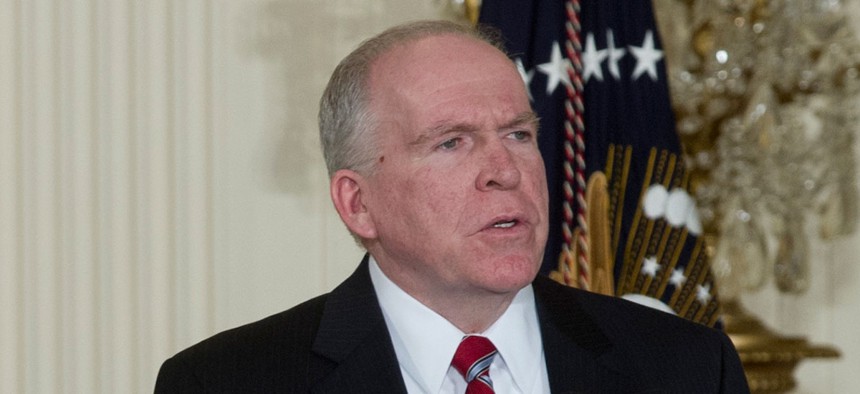
Petty Officer 1st Class Chad McNeeley / Navy file photo
CIA Director Calls 9/11 Legislation 'Badly Misguided'
Congress delivered a historic rebuke to the administration on Wednesday by overriding Obama’s veto.
CIA Director John Brennan warned against the national security risks of legislation that would allow families of victims of the September 11, 2001 terror attacks to sue the government of Saudi Arabia on Wednesday.
“I think the legislation is badly misguided and doesn’t take into account the negative impact on U.S. national security,” Brennan told Jeffrey Goldberg at the Washington Ideas Forum presented by The Atlantic and the Aspen Institute. Brennan added: “We all recognize that the emotions associated with 9/11 are still quite palpable [and] …. the victims’ families are still seeking justices, but the 9/11 commission report said that there was no evidence that the Saudi government as an institution or senior Saudi officials, individually, were responsible for the 9/11 attack.”
Congress voted to override the president’s veto on Wednesday, paving the way for the bill to become law and marking the first successful veto override of the Obama presidency.
The CIA director cautioned that the implications of the legislation extend far beyond potentially damaging the relationship between the United States and Saudi Arabia. “I think there’s a very, very dangerous slippery slope that we’re going to get on,” Brennan said, adding that “foreign governments are going to start to pass similar type of legislation that is going to haul the United States into court overseas, even for the most frivolous charges and allegations for what the U.S. has done overseas.”
During the course of a wide-ranging conversation on U.S. national security and foreign policy, Brennan declined to say outright that Russia has intervened in the U.S. presidential election. But he warned that “Russia has tremendous capabilities in the cyber realm” and that “the Russians have been very active globally in trying to influence political developments in a variety of countries, including engaging in election politics and manipulation in countries overseas.”
Yet the CIA director did not refute the possibility that, as Goldberg put it, Russia “is trying to, in essence, hack our election.” “The U.S. government right now is very much aware and working on the issue of who might be trying to get into and intrude in the electoral systems … What we do at CIA is to look at a country’s capabilities, look at their intent, look at things that they have done in the past, and determine whether something that certainly looks like a duck, smells like a duck and flies like a duck, whether it’s a duck or not.”
There is a widespread belief among cyber security experts that state-sponsored Russian hackers were responsible for the hack that led to leaked emails from the Democratic National Committee released on the eve of the Democratic National Convention. Last week, Democratic senator Dianne Feinstein and congressman Adam Schiff formally released a statement saying that “based on briefings,” they had “concluded that the Russian intelligence agencies are making a serious and concerted effort to influence the U.S. election.” The statement added that “this effort is intended to sow doubt about the security of our election and may well be intended to influence the outcomes of the election—we can see no other rationale for the behavior of the Russians.”
Trump has praised Russian President Vladimir Putin during his campaign,provoking criticism and anxiety among high-profile Republicans. Hillary Clinton’s campaign manager Robby Mook said in August that there are “real questions” as to whether Trump is “just a puppet for the Kremlin in this race.”
Brennan also warned about the negative national security implications of divisive political rhetoric. “Making comments that are incendiary and that are viewed as attacking a religion or a people or a community only further drive those individuals to grasp onto those extremist views,” Brennan said after Goldberg asked whether the way Trump has talked about Muslims during the election, which includes a call to ban Muslims from entering the country, hurts national security interests. “They interpret a lot of the comments that are made as the West and the United States are against them ... It's the extremist comments on both sides of this have just fed those sources of extremism.”







